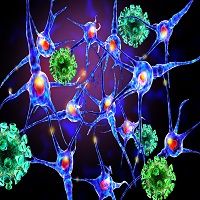Article
Myeloid Cells Key to MS?
Author(s):
A better understanding of myeloid cells and their role in the immunopathology of multiple sclerosis (MS) could lead to therapeutic interventions that improve the prognosis of MS,

A better understanding of myeloid cells and their role in the immunopathology of multiple sclerosis (MS) could lead to therapeutic interventions that improve the prognosis of MS, according to the authors of a recent review. Published in the journal Nature on August 12, 2016, the review was authored by Manoj K. Mishra, PhD, and V. Wee Yong, PhD, both of Hotchkiss Brain Institute and the Department of Clinical Neurosciences at the University of Calgary, in Alberta, Canada.
The reviewers begin by noting that “the involvement of lymphocytes of the adaptive immune system in MS pathogenesis is widely acknowledged, whereas innate myeloid antigen-presenting cells (APCs), which include monocytes, macrophages, dendritic cells and microglia, are less commonly linked to the disease.” They point out that some myeloid cells, such as macrophages and microglia are the main inflammatory cells in active MS and that they persist in secondary progressive MS.
The review discusses the types and subtypes of myeloid cells, as well as their involvement in MS in the inflammatory animal model experimental autoimmune encephalomyelitis (EAE). Additionally, the reviewers say they “consider the mechanisms by which they cause tissue injury, and discuss the impact on on myeloid cells of immunomodulators that are used to treat MS.”
The authors review several previous studies, in which, they say, the “findings all suggest that inhibition of neurotoxic microglia is likely to be a useful therapeutic strategy in MS, but many currently used MS medications have a poor capacity to cross the blood-brain barrier.” They then say, “although activated macrophages in active MS lesions predominantly exhibit proinflammatory characteristics, a considerable number of these cells have a mixed proinflammatory and regulatory activation status.”
Although in this review monocytes, macrophages, dendritic cells and microglia are collectively referred to as myeloid cells, the authors say, “these cell types could be differentially affected by immunomodulators, and this possibility requires further examination.” They also suggest that some “aspects of myeloid cell function are beneficial.” Some medications preserve the beneficial functions of myeloid cells while also blocking the damaging effects. The authors offer glatiramer acetate as an example, saying it, “reduces proinflammatory myeloid properties by generating regulatory myeloid cells.”
“However, further therapeutics that are targeted specifically to myeloid cells would be an advantage,” say the reviewers. They conclude, “A greater understanding of the complex properties of myeloid cells in health and in MS will aid the development of such therapies and improve the management and prognosis of MS.”




